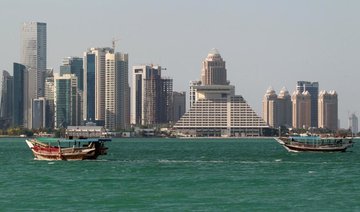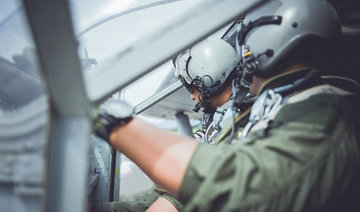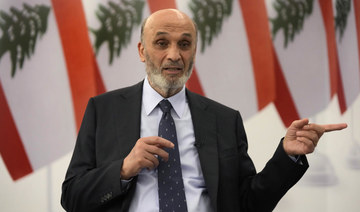WASHINGTON: The United States and Qatar on Tuesday inked a deal to resolve a years-old quarrel over alleged airline subsidies, as Qatar’s government works to defuse tensions with the Trump administration.
A formal announcement came Tuesday, as Secretary of State Rex Tillerson and Defense Secretary Jim Mattis hosted the inaugural round of the US-Qatar strategic dialogue. Agreements, on security and counter-terrorism cooperation and combatting human trafficking, were also signed.
“Qatar is a strong partner and long-time friend of the United States,” Tillerson said, welcoming the agreements. Tuesday’s meeting follows harsh criticism of Qatar from President Donald Trump. He denounced the country last year for allegedly funding terrorism amid a row between the country and other members of the Gulf Cooperation Council, who have imposed a land, sea and air blockade on it.
Qatar hopes to change that narrative by enhancing counterterrorism cooperation and allowing greater US visibility into its finances and banking practices.
Tillerson and Mattis said the US remains deeply concerned about the situation as it nears its eight-month mark, including hostile “rhetoric and propaganda” being employed. They called on all parties to the dispute to renew efforts to end it.
Qatar is home to a major US military base that is key to the fight against Daesh in Iraq and Syria and Mattis said that “a united GCC bolsters our effectiveness on many fronts.”
The aviation agreement will see state-owned Qatar Airways agree voluntarily to open up its accounting books. US airlines say the company receives billions of dollars in government payments that leave them at a competitive disadvantage. Qatar also made a loose commitment that the flag carrier won’t launch flights to the United States from Europe or other non-Qatari cities, creating yet more competition for the US airlines.
Both sides of the dispute can claim the agreement as a victory — for very different reasons.
The US airline industry can claim the increased transparency will create a powerful disincentive to unfair subsidies, as Qatar will no longer be able to mask such payments through creative accounting. The three major US carriers — Delta Air Lines, American Airlines and United Airlines — have spent huge sums over the last three years pressing the Obama administration and Trump administration for tough action. They’re eager to show a win.
Yet for Qatar, the agreement averts the more serious step US airlines wanted: re-opening the so-called open-skies treaties that could lead to less favorable conditions for Arabian Gulf airlines. And, it means that Qatar can also show it’s cooperating closely and productively with US regulators.
That could help the tiny gas-rich kingdom draw a contrast with the United Arab Emirates, whose two airlines are also accused of improper subsidies but have yet to reach an agreement with Washington.
“Everybody gets to claim victory in this,” said Helane Becker, an airline analyst for Cowen and Co.
Indeed, even before the announcement, American, the world’s biggest airline by passenger traffic, praised the deal as a way to “thoughtfully address” Qatari subsidies. And United CEO Oscar Munoz applauded the agreement while thanking Trump’s administration for “effectively representing the interests of the American aviation industry.”
In an eight-paragraph document laying out “understandings” between Qatar and the US, the Gulf nation commited within one year to releasing audited financial statements for Qatar Airlines “in accordance with internationally-recognized accounting standards.” Within two years, Qatar Airways is to disclose any transactions with other state-owned entities, such as caterers or other companies that support airline operations.
A side-letter to the agreement stated that Qatar’s civilian aviation authority is unaware of any plans by Qatar Airlines to start so-called “Fifth Freedoms” flights — routes from third countries to the United States. Under the scenario US airlines fear, Qatar Airways could offer flights from its Doha hub to, say, Paris or London, stop to pick up more passengers, then fly on to New York.
The side-letter only says there are no current plans to operate such service. That’s short of a binding guarantee. There’s also no commitment Qatar Airways won’t expand its offering of Qatar-US flights.
“This appears to be the administration essentially throwing a meatless bone to the three US carriers to put an end to their rants against the Gulf carriers,” said John Byerly, who was the chief open skies negotiator in the Obama administration and has also consulted for Emirates Airline and UPS.
The two UAE airlines — Dubai-based Emirates and Abu Dhabi-based Etihad Airways — aren’t a party to the US-Qatar agreement. Emirates Airline currently offers “Fifth Freedom” flights in which passengers can fly from New York-area airports to Milan, Italy or Athens without ever setting foot in the UAE.
All three Gulf airlines have long denied receiving unfair government subsidies. There was no immediate reaction from either Emirates or Etihad.
US, Qatar reach agreement on subsidy spat with airlines
US, Qatar reach agreement on subsidy spat with airlines

US weapon system identified in Israeli Lebanon strike may breach international law

- Guardian investigation with Human Rights Watch identifies Boeing-made Joint Direction Attack Munition fragments at site where aid workers were killed
- US bans export of such systems to foreign militaries where ‘credible information’ of human rights breaches exists
LONDON: An Israeli airstrike in Lebanon that killed seven aid workers in March may have been conducted with a US-supplied weapon system, according to an investigation by The Guardian.
The incident claimed the lives of seven paramedics aged 18-25, all volunteers, at an ambulance center in Al-Habariyeh in southern Lebanon on March 27.
It came five days before an Israeli strike in Gaza killed seven aid workers working for World Central Kitchen.
Debris found at the scene in Al-Habariyeh was identified by The Guardian, an independent expert and Human Rights Watch as having belonged to a 500-pound Israeli MPR bomb and a Boeing-made Joint Direction Attack Munition, a system attached to explosives to turn them from “dumb bombs” into GPS-guided weapons.
HRW’s Lebanon researcher Ramzi Kaiss told The Guardian: “Israel’s assurances that it is using US weapons lawfully are not credible. As Israel’s conduct in Gaza and Lebanon continues to violate international law, the Biden administration should immediately suspend arms sales to Israel.”
The US government is legally unable to help or arm foreign militaries where “credible information” of human rights abuses exists, under the terms of the 1997 Leahy law.
A spokesperson for the US National Security Council told The Guardian: “The US is constantly working to ensure defense articles provided by the US are being used consistent with applicable domestic and international law. If findings show violations, we take action.”
But Josh Paul, a non-resident fellow with Democracy for the Arab World Now and a former State Department employee, said: “The State Department has approved several of these (weapons) transfers on a 48-hour turnaround. There is no policy concern on any munitions to Israel other than white phosphorus and cluster bombs.”
He added that JDAMs have been “key items” regularly requested by Israel since the start of the Gaza war.
Secretary of State Antony Blinken will deliver a report on Wednesday to Congress on Israel’s use of American weapons and whether they may have been involved in violations of this or other laws.
Maryland Sen. Chris Van Hollen told The Guardian that the findings from Al-Habariyeh are “deeply concerning and must be fully investigated by the Biden administration, and their findings should certainly be included in the NSM-20 report that is due to be submitted to the Congress on May 8.”
The airstrike on the ambulance center in Al-Habariyeh came without warning before 1 a.m. on March 27. No fighting had been reported in the area.
The victims had been at the center for the night shift, and were named as twin brothers Hussein and Ahmad Al-Shaar, aged 18; Abdulrahman Al-Shaar, 19; Mohammad Hamoud, 21; Mohammad Al-Farouk Aatwi, 23; Abdullah Aatwi, 24; and Baraa Abu Kaiss, 24.
The Israeli military claimed that the strike, which leveled the two-storey building, killed a “prominent terrorist belonging to Jamaa Islamiya,” an armed Lebanese political group with ties to Hezbollah. It did not identify the person by name.
A Jamaa Islamiya spokesman acknowledged that some of the ambulance volunteers were members of the group, but denied that they were part of its armed wing.
Samer Hardan, head of the local Civil Defense center who was among the first responders, told The Guardian: “We examined every centimetre looking for parts of bodies and their possessions. We saw nothing military-related. We knew (the victims) personally, so we could identify their remains.”
Since Oct. 7, 16 medical workers have been killed by Israeli airstrikes in Lebanon, and a further 380 people have died including 72 civilians. Eleven Israeli soldiers and eight civilians have also been killed.
Kassem Al-Shaar, father of Ahmad and Hussein, said he had warned his sons not to volunteer.
“I told them that it was dangerous to do this type of work, but they said that they accepted the risk. I don’t know what Israel was thinking — these were young people excited to help others,” he said.
“My sons wanted to do humanitarian work, and look what happened to them. Israel wouldn’t dare to do what they did if it wasn’t for the US standing behind them.”
Aid groups issue urgent appeal for Yemen funds
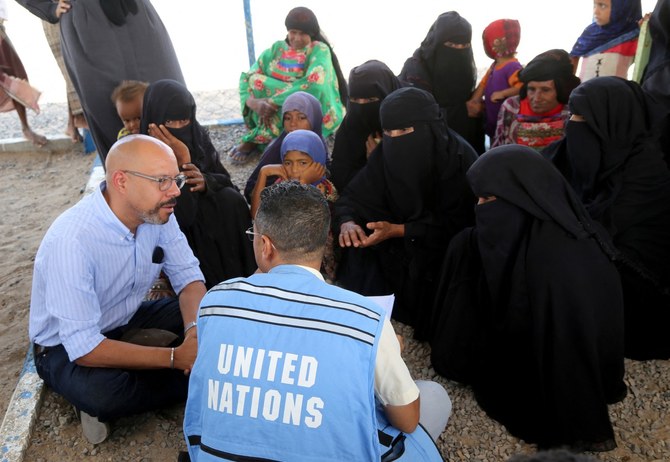
- UN agencies warned that 18.2 million people in need of help after nine years of war
Dubai: Nearly 200 aid groups appealed on Monday for funds to bridge a $2.3 billion shortfall in assistance for war-torn Yemen, warning of potentially “catastrophic consequences” for the Arabian Peninsula’s poorest country.
A joint statement from 188 humanitarian organizations, including several UN agencies, warned that 18.2 million people — more than half the population — were in need of help after nine years of war.
Their appeal came a day before a meeting of high-ranking EU officials in Brussels to discuss the aid program for Yemen, which is suffering one of the world’s worst humanitarian crises.
“Inaction would have catastrophic consequences for the lives of Yemeni women, children and men,” the statement said, calling Tuesday’s meeting a “critical moment.”
“The humanitarian community appeals to donors to urgently address existing funding gaps, and provide sustainable support to enhance resilience and reduce aid dependency.”
Yemen has been gripped by conflict since the Iran-backed Houthis overran the capital Sanaa in 2014, triggering the Saudi-led military intervention in support of the government the following year.
Hundreds of thousands have died in the fighting or from indirect causes such as a lack of food, the United Nations says.
Hostilities slowed considerably in April 2022, when a six-month, UN-brokered ceasefire came into effect, and they have remained at a low level since.
But only $435 million of the $2.7 billion called for in Yemen’s 2024 Humanitarian Response Plan requirement has been raised, the aid groups said, warning of threats including food insecurity, cholera and unexploded ordnance.
“Underfunding poses a challenge to the continuity of humanitarian programming, causing delays, reductions and suspensions of lifesaving assistance programs,” it said.
“These challenges directly affect the lives of millions who depend on humanitarian assistance and protection services for survival.”
UN atomic watchdog chief Rafael Grossi arrives in Iran: media
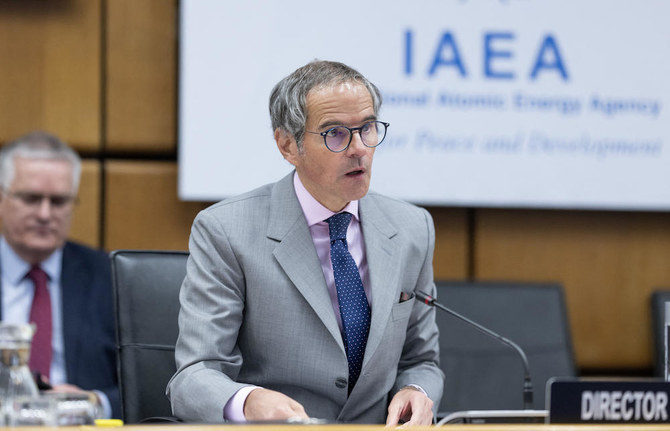
- Visit comes at a time of heightened regional tensions and with IAEA criticizing Iran for lack of cooperation on inspections and other outstanding issues
TEHRAN: UN atomic watchdog chief Rafael Grossi arrived Monday in Iran, where he is expected to speak at a conference and meet officials for talks on Tehran’s nuclear program.
“The Director General of the International Atomic Energy Agency arrived in Tehran on Monday at noon at the head of a delegation to participate in the nuclear conference and negotiate with top nuclear and political officials of the country,” Tasnim news agency said, with other agencies reporting the same details.
The visit comes at a time of heightened regional tensions and with the IAEA criticizing Iran for lack of cooperation on inspections and other outstanding issues.
Grossi, head of the IAEA, is expected to deliver a speech at Iran’s first International Conference on Nuclear Science and Technology.
The three-day event, which starts on Monday, is being held in Isfahan province, home to the Natanz uranium enrichment plant and where strikes attributed to Israel hit last month.
The IAEA and Iranian officials reported “no damage” to nuclear facilities after the reported attack on Isfahan, widely seen as Israel’s response to Iran’s first-ever direct attack on its arch foe days earlier, which itself was a retaliation for a deadly strike on Tehran’s Damascus consulate.
During his visit, Grossi is expected to meet with Iranian officials including the Islamic republic’s nuclear chief Mohammad Eslami.
On Wednesday Eslami, head of the Atomic Energy Organization of Iran, said he was “sure that these negotiations will further help clear ambiguities, and we will be able to strengthen our relations with the agency.”
Iran in recent years has deactivated IAEA monitoring devices at nuclear facilities and barred inspectors, according to the UN agency.
Grossi last visited Iran in March 2023 and met with top officials including President Ebrahim Raisi.
Iran has suspended its compliance with caps on nuclear activities set by a landmark 2015 deal with major powers after the United States in 2018 unilaterally withdrew from the agreement and reimposed sweeping sanctions.
Tensions between Iran and the IAEA have repeatedly flared since the deal fell apart, while EU-mediated efforts have so far failed both to bring Washington back on board and to get Tehran to again comply with the terms of the accord.
Last year, Iran slowed down the pace of its uranium enrichment, which was seen as a goodwill gesture while informal talks began with the United States.
But the Vienna-based UN nuclear agency said Iran accelerated the production of 60-percent enriched uranium in late 2023.
Enrichment levels of around 90 percent are required for military use.
Tehran has consistently denied any ambition to develop nuclear weapons, insisting that its atomic activities were entirely peaceful.
In February, the IAEA said in a confidential report seen by AFP that Iran’s estimated stockpile of enriched uranium had reached 27 times the limit set out in the 2015 accord.
On Sunday, the Iranian official news agency IRNA said Grossi’s visit provides “an opportunity for the two sides to share their concerns,” especially with regard to the IAEA’s inspectors.
Iran in September withdrew the accreditation of several inspectors, a move described at the time by the UN agency as “extreme and unjustified.”
Tehran, however, said its decision was a consequence of “political abuses” by the United States, France, Germany and Britain.
Eslami said the IAEA has “more than 130 inspectors” working in Iran, insisting Tehran remains committed to cooperating with the nuclear watchdog.
Lebanon’s Hezbollah says fired dozens of rockets at Israeli base

- The Israeli army said its warplanes “struck a Hezbollah military structure... deep inside Lebanon,”
The Iran-backed Hezbollah group said it fired “dozens of Katyusha rockets” at an Israeli base in the occupied Golan Heights on Monday in retaliation for a strike in Lebanon’s east.
Earlier, Lebanese official media said three people had been wounded in an Israeli strike early Monday in the country’s east, with the Israeli army saying it had struck a Hezbollah “military compound.”
Hezbollah fighters launched “dozens of Katyusha rockets” targeting “the headquarters of the Golan Division... at Nafah base,” the group said in a statement, saying it was “in response to the enemy’s attack targeting the Bekaa region.”
Israel and Lebanon’s Hezbollah have exchanged regular cross-border fire since Palestinian militant group Hamas’s unprecedented October 7 attack on southern Israel sparked war in the Gaza Strip.
In recent weeks Hamas-ally Hezbollah has stepped up its attacks on northern Israel, and the Israeli military has struck deeper into Lebanese territory.
“Enemy warplanes launched a strike at around 1:30 am this morning on a factory in Sifri, wounding three civilians and destroying the building,” Lebanon’s official National News Agency said.
Sifri is located in Lebanon’s Bekaa Valley, near the city of Baalbek, around 80 kilometers from the Israel-Lebanon frontier.
The Israeli army said its warplanes “struck a Hezbollah military structure... deep inside Lebanon,” referring to the location as “Safri.”
Last month, a building in Sifri was targeted in an Israeli raid, according to a source close to Hezbollah, while the Israeli army said it had targeted Hezbollah sites in Lebanon’s east.
East Lebanon’s Baalbek area is a Hezbollah stronghold and has been repeatedly struck by Israel in recent weeks.
On Sunday official media in Lebanon said an Israeli strike on a southern village killed four family members, with Hezbollah announcing retaliatory fire by dozens of rockets toward Kiryat Shmona in northern Israel.
The intensifying exchanges have stoked fears of all-out conflict between Israel and Hezbollah, which went to war in 2006.
In Lebanon, at least 390 people have been killed in nearly seven months of cross-border violence, mostly militants but also more than 70 civilians, according to an AFP tally.
Israel says 11 soldiers and nine civilians have been killed on its side of the border.
Tens of thousands of people have been displaced on both sides.
Israel attacks Rafah after Hamas claims responsibility for deadly rocket attack
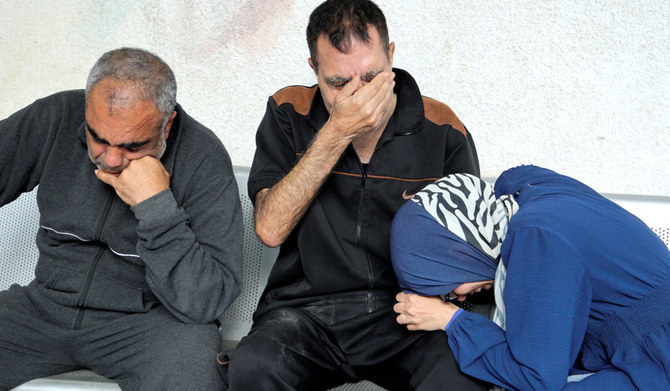
- Hamas claims attack on Kerem Shalom crossing into Gaza that Israel says killed three soldiers
- Sunday's attack on the crossing came as hopes dimmed for ceasefire talks underway in Cairo
CAIRO: Three Israeli soldiers were killed in a rocket attack claimed by Hamas armed wing, near the southern Gaza Strip city of Rafah, where Palestinian health officials said at least 19 people were killed by Israeli fire on Sunday.
Hamas's armed wing claimed responsibility on Sunday for an attack on the Kerem Shalom crossing into Gaza that Israel said killed three of its soldiers.
Israel's military said 10 projectiles were launched from Rafah in southern Gaza towards the area of the crossing, which it said was now closed to aid trucks going into the coastal enclave. Other crossings remained open.
Hamas' armed wing said it fired rockets at an Israeli army base by the crossing, but did not confirm where it fired them from. Hamas media quoted a source close to the group as saying the commercial crossing was not the target.
More than a million Palestinians are sheltering in Rafah, near the border with Egypt.
Shortly after the Hamas attack, an Israeli airstrike hit a house in Rafah killing three people and wounding several others, Palestinian medics said.
The Israeli military confirmed the counter-strike, saying it struck the launcher from which the Hamas projectiles were fired, as well as a nearby "military structure".
"The launches carried out by Hamas adjacent to the Rafah Crossing ... are a clear example of the terrorist organisation's systematic exploitation of humanitarian facilities and spaces, and their continued use of the Gazan civilian population as human shields," it said.
Hamas denies it uses civilians as human shields.
Just before midnight, an Israeli air strike killed nine Palestinians, including a baby, in another house in Rafah, Gaza health officials said. They said the new strike increased the death toll on Sunday to at least 19 people.
Israel has vowed to enter the southern Gaza city and flush out Hamas forces there, but has faced mounting pressure to hold fire as the operation could derail fragile humanitarian efforts in Gaza and endanger many more lives.
Sunday's attack on the crossing came as hopes dimmed for ceasefire talks under way in Cairo.
The war began after Hamas stunned Israel with a cross-border raid on Oct. 7 in which 1,200 people were killed and 252 hostages taken, according to Israeli tallies.
More than 34,600 Palestinians have been killed, 29 of them in the past 24 hours, and more than 77,000 have been wounded in Israel's assault, according to Gaza's health ministry.



